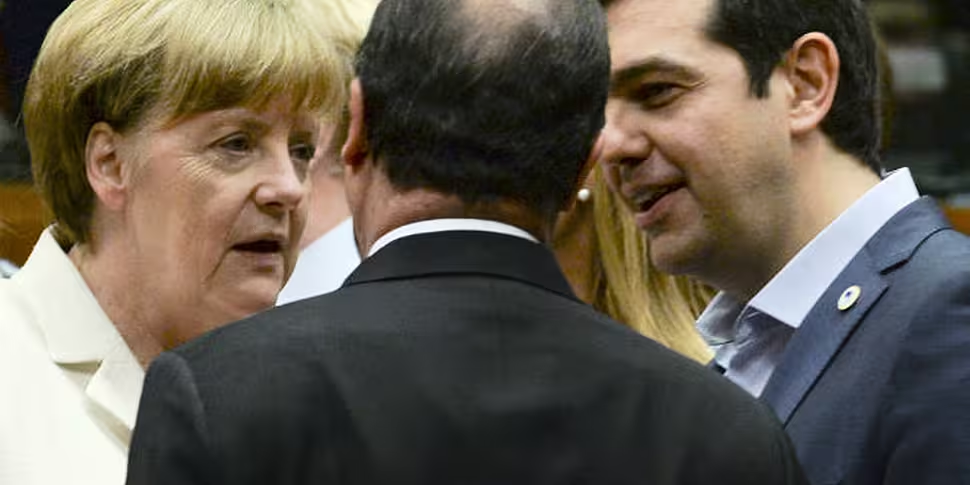The Greek government has been told it will have to pass a series of sweeping reforms into law by Wednesday before talks with eurozone leaders on another bailout can begin.
Greece has requested a new loan of €53.5bn over three years to avoid financial collapse and a potential exit from the single currency.
But officials in Brussels say the figure may have to be much higher - up to €86bn - and they have insisted on more tough austerity measures.
Taoiseach Enda Kenny is still in talks with his eurozone counterparts over discussions regarding a third Greek bailout.
Eurozone finance ministers issued a statement with tentative plans for a Greek bailout to leaders today which detailed a comprehensive austerity package for Greece.
Shona Murray reports from Brussels:
Leaders have said Athens must push six measures, including tax and pensions reforms, through parliament by Wednesday night to restore trust before discussions start.
The 18 chiefs have been meeting in the Belgian city to talk about Greece's request for a third bailout in five years.
But in a sign of division among the leaders, a draft document also included an option for Greece to temporarily leave the euro if no deal was agreed - a potential "time-out."
The Greek government has apparently agreed to a series of demands it previously criticised, including allowing creditors' officials to have a base in the capital Athens.
In the document by eurozone finance ministers sent to their leaders, Greece agreed to carry out "ambitious" pension and tax reforms and "significantly" increase its privatisation programme.
And it has also accepted it will push reforms into law this week on a first set of measures as it tries to avoid a "Grexit."
If Greece honours the conditions, the German parliament would meet on Thursday to allow Chancellor Angela Merkel and finance minister Wolfgang Schaeuble to open talks on a new loan.
Then Eurogroup finance ministers would meet again on Friday or at the weekend to formally launch the negotiations.
The draft said Greece needed €7bn by July 20, when it must make a payment to the European Central Bank, and a total of €12bn by mid-August when another ECB payment is due.
Greece's proposals for a new bailout, backed by parliament, are aimed at offering to bring in tax rises and spending cuts in return for another loan. The plans are similar to those rejected by the Greek people in a referendum.
Greece has already had two bailouts worth €240bn from eurozone countries and the International Monetary Fund since 2010.
But its economy has shrunk by a quarter since the crisis began, unemployment has soared above 25% and one in two young people is out of work.
The eurozone talks were not about whether to agree a new bailout but rather over whether to allow further negotiations over the rescue package pushed by Greece.
Speaking ahead of the talks, Greece's Prime Minister Alexis Tsipras said: "We can reach an agreement tonight if all parties want it."
But Mrs Merkel cautioned there would not be a deal later on Sunday "at any price" and she said trust in debt-laden Athens had been lost, warning of "tough" negotiations ahead.
Germany is Greece's biggest creditor and Mrs Merkel said: "The most important currency has been lost and that is trust. That means that we will have tough discussions and there will be no agreement at any price."
However, French President Francois Hollande said he was going to do everything he could to keep Greece in the euro.
A planned summit on Sunday of all 28 European Union leaders, including David Cameron, that would have been needed in case there was a "Grexit" from the single currency was cancelled due to slow progress during finance minister talks.
The planned EU summit had previously been called the "last chance" for a deal by the European Council President Donald Tusk.
Earlier, two days of discussions among eurozone finance ministers "had come a long way" but there were still some "big issues", the head of the Eurogroup, Jeroen Dijsselbloem, said.
Taoiseach Enda Kenny says Greece has strengthened its commitment to reform which will help to build trust.









